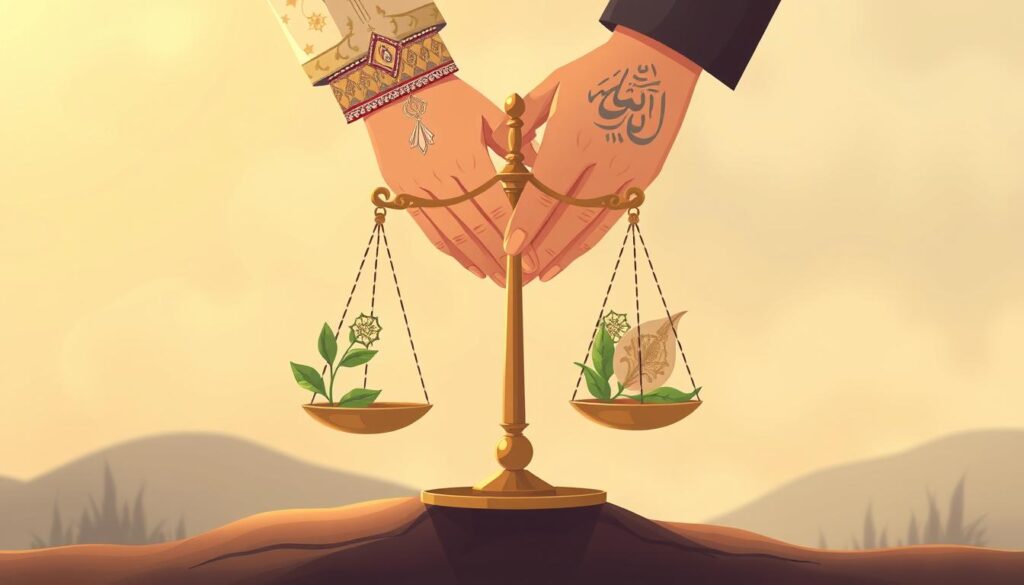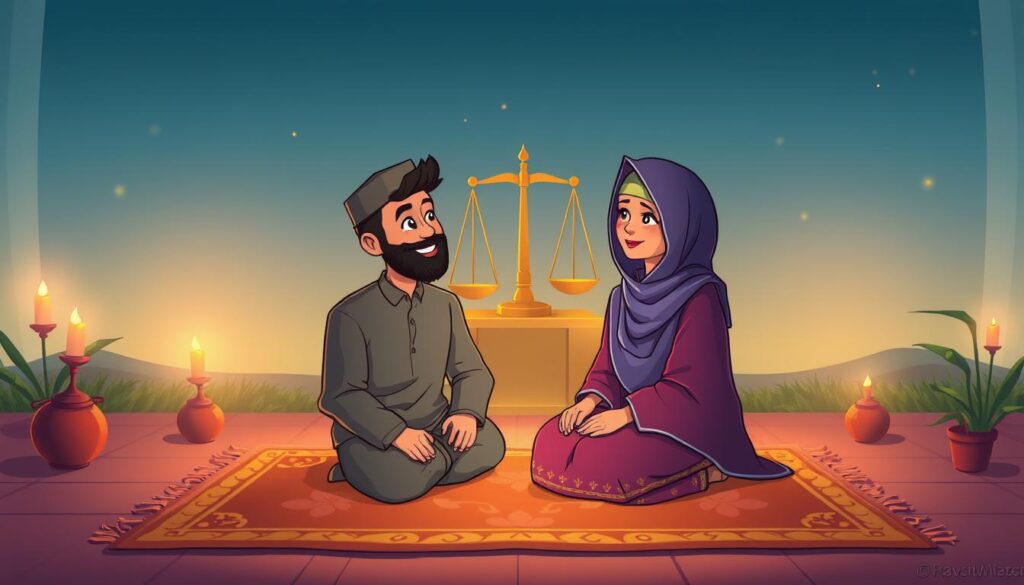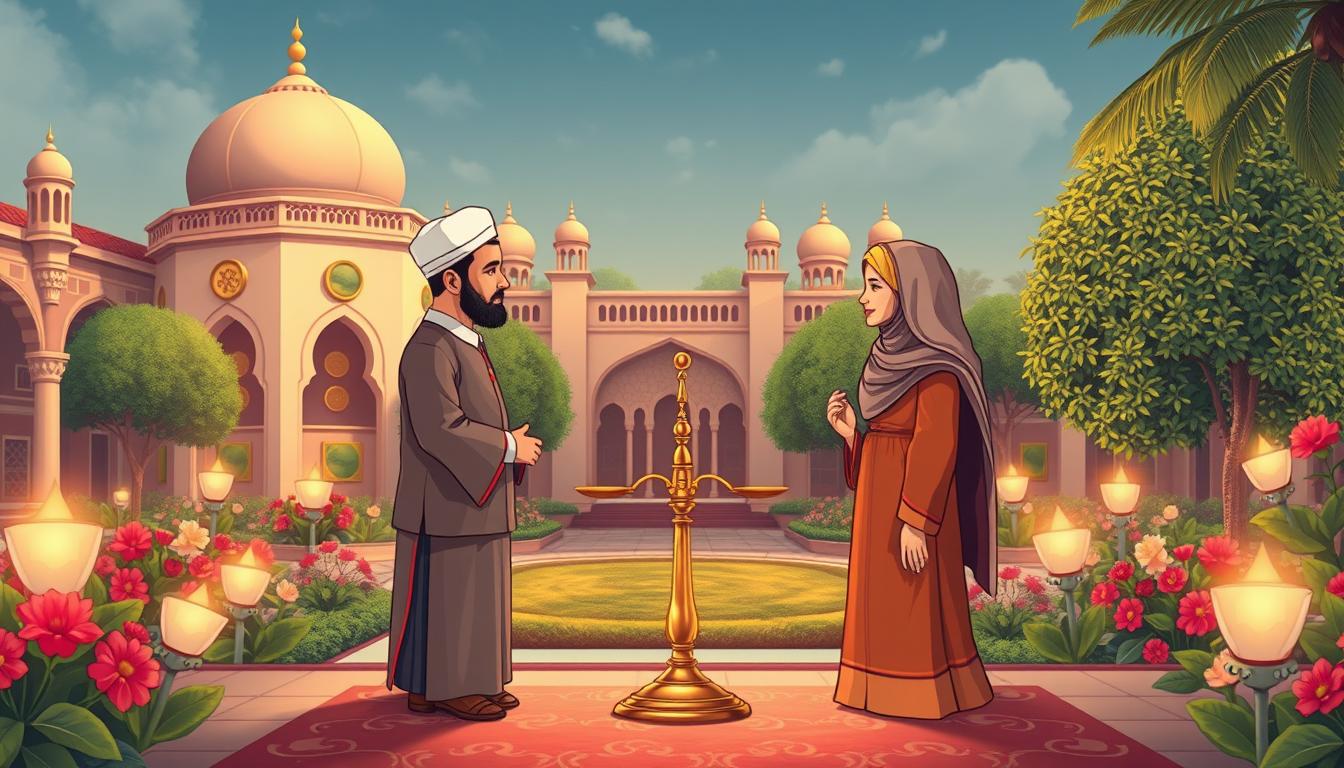We at Umar Khan Charity Organization believe in the importance of understanding and implementing the rights of husband and wife in Islam. This helps in building stronger, more loving families. Islamic teachings say marriage is a sacred bond between two individuals. Each has rights and responsibilities towards the other.
The Quran stresses the importance of mutual respect and kindness in marital relationships. It highlights the significance of marital rights and spousal rights in building a harmonious family.
A surprising fact is that the Quran commands husbands to give the mahr to their wives. Islamic scholars also state that husbands must provide spending and accommodations for wives. This financial support is a key aspect of marital rights, ensuring that wives are well taken care of.
Understanding the rights of husband and wife is key for building strong, harmonious families. It is a vital aspect of Islamic teachings on marriage. By examining the Quran and Hadith, we can gain insights into the roles and expectations of both husbands and wives. This promotes a deeper understanding of the Islamic concept of marriage as a partnership, where both spouses have equal marital rights and spousal rights.
Introduction to Marital Rights
We will explore the balanced rights of husband and wife in Islam. These rights, including financial support, are essential for a healthy and loving relationship. The principles of mutual respect, kindness, and responsibility guide these rights.
Key Takeaways
- Marriage is a sacred bond between two individuals in Islam, with each having rights and responsibilities towards the other.
- The Quran emphasizes the importance of mutual respect and kindness in marital relationships, highlighting the significance of marital rights and spousal rights.
- Husbands must provide financial support, including mahr, spending, and accommodations, as part of their marital rights and responsibilities.
- Understanding the rights of husband and wife is key for building strong, harmonious families and is a vital aspect of Islamic teachings on marriage.
- Both spouses have equal marital rights and spousal rights, and must work together to maintain a healthy and loving relationship.
- Islamic teachings emphasize the importance of kindness, respect, and responsibility in marital relationships, promoting a deeper understanding of the Islamic concept of marriage as a partnership.
Understanding Islamic Marital Rights
Understanding the history and laws of marital rights in Islam is key for strong, healthy relationships. The legal rights of spouses are built on respect, trust, and working together. In Islam, marriage is a sacred bond, with clear conjugal rights for both husbands and wives.
The idea of marriage in Islam comes from the Prophet Muhammad (PBUH) and the early Muslim community. It aims to create love and happiness, raise children in a stable home, and protect society from harm. Choosing a spouse focuses on their faith and good character, with prayer helping find the right partner.
- The husband must give his wife a dowry (mahr).
- The husband must provide his wife with her own place to live.
- The husband must make sure his wife has food.
By knowing and following these rights, couples can start a strong, happy marriage. It’s based on the legal rights of spouses and conjugal rights.
The Rights of a Husband in Islam
Understanding the rights of a husband in Islam is key to a happy marriage. A husband has the right to be respected and obeyed by his wife. He also has the right to financial support and to manage the household. These rights come with the responsibility to provide for his wife and treat her with kindness.
Some of the key rights of a husband in Islam include:
- Financial support: The husband is responsible for providing for his wife and family.
- Emotional support: The husband is expected to provide emotional support and companionship to his wife.
- Respect and obedience: The husband has the right to be respected and obeyed by his wife, as long as he fulfills his responsibilities.
In terms of matrimonial rights, the husband expects his wife’s faithfulness and loyalty. He also has spouse rights like the right to intimacy and companionship. Plus, he has marital privileges such as making family decisions and being the household leader.
The rights of a husband in Islam are vital for a strong marriage. By respecting these rights, couples can create a harmonious and fair partnership.
| Right | Description |
|---|---|
| Financial Support | The husband is responsible for providing for his wife and family. |
| Emotional Support | The husband is expected to provide emotional support and companionship to his wife. |
| Respect and Obedience | The husband has the right to be respected and obeyed by his wife, as long as he fulfills his responsibilities. |
The Rights of a Wife in Islam
We understand the value of recognizing and honoring a wife’s rights in Islam. These rights are designed to ensure her well-being and dignity in marriage. A wife should expect financial support, emotional care, and respect from her husband. She also has the right to participate in family decisions.
Key rights of a wife include marital entitlements like financial support. This means her husband must provide for her needs, like food, clothes, and household items. She also has the right to spouse rights such as emotional support and kindness. These are vital for a happy and fulfilling marriage.
Regarding conjugal rights, a wife has the right to intimacy and sexual satisfaction. This is a key part of a good marriage. By respecting these rights, husbands can help create a more balanced and fulfilling partnership with their wives.
Some important aspects of a wife’s rights in Islam are:
* The right to financial support
* The right to emotional support and kindness
* The right to intimacy and sexual satisfaction
* The right to contribute to family decisions
By recognizing and respecting these rights, we can strive for a more harmonious and balanced marriage. This is essential for a healthy and fulfilling family life.
Equality in Marriage: A Fundamental Principle
We believe that equality in marriage is key. It means that husbands and wives have the same marital rights and spousal rights. They should work together to build a strong and loving relationship.
Studies show that equal legal rights of spouses lead to happier marriages. For instance, husbands who listen to their wives are less likely to face divorce or unhappiness.
Equality in marriage brings many benefits. These include:
- Increased productivity at work due to reduced distraction by home concerns
- Improved communication and conflict resolution skills
- Greater emotional satisfaction and happiness in the relationship
- More equal distribution of household tasks and childcare responsibilities
To promote equality in marriage, we must value marital rights and spousal rights. By working together and upholding equality, we can build a more just and loving society.
| Benefits of Equality in Marriage | Outcomes |
|---|---|
| Increased productivity at work | Reduced distraction by home concerns |
| Improved communication and conflict resolution skills | Greater emotional satisfaction and happiness in the relationship |
Marital Responsibilities: Balancing Rights
We think that marital duties are a team effort, not just one person’s job. Talking openly and making decisions together is key. This way, husbands and wives in Islam can respect each other’s roles and build a strong marriage.
Studies show that when chores are shared fairly, couples are happier. This is because husband and wife legal rights are honored, making both feel important. Also, conjugal rights and matrimonial rights help keep a marriage healthy and happy.
Important steps to balance duties include:
- Talking openly about needs and duties
- Deciding together on family issues
- Respecting each other’s views and feelings
By following these steps, couples can have a fair and loving relationship. This leads to a marriage where husband and wife legal rights, conjugal rights, and matrimonial rights are cherished.
Legal Framework Surrounding Marital Rights
We aim to give you an overview of the legal framework for marital rights in Islam. This framework is based on Sharia law. It guides all aspects of marriage, including rights, responsibilities, and divorce.
It’s key to understand this framework to grasp the legal rights of spouses and spouse rights in Islam. The legal framework for marital rights is complex. It’s influenced by Sharia law and the legal systems of different countries.
Sharia Law and Its Implications
Sharia law is important in shaping the marital privileges and rights of spouses in Islam. By looking at this framework, Muslims can understand their rights and duties in marriage. They can also see how these are protected and enforced under Islamic law.
Some key aspects of the legal framework for marital rights include:
- Financial support and maintenance
- Emotional and social rights
- Right to respect and obedience
Family Law in Different Countries
Family law varies across countries, and it’s important to know these differences. Understanding these variations helps us see the complexities of legal rights of spouses and spouse rights. This knowledge helps us strive for a more harmonious and fair society for everyone.

Conflict Resolution in Islamic Marriages
We know that conflicts in marriage are common. They can either break a couple apart or make their bond stronger. In Islamic marriages, it’s key to handle conflicts in a way that honors both spouses’ rights.
Couples should talk calmly and respectfully when problems come up. This helps avoid things getting worse and leads to a better solution. Getting help from a mediator or counselor can also help keep the marriage strong.
Important things to think about when solving conflicts include:
- Listening carefully to each other’s views
- Respecting each other’s rights in the marriage
- Looking for help from a mediator or counselor when needed
By using these strategies, couples can find ways to overcome their differences. This makes their relationship stronger and respects the rights of both partners.
Cultural Influences on Marital Rights
Marital rights can change based on local customs and cultural practices. These can vary a lot in different Islamic societies. It’s key to understand these cultural influences to see the variety of marital practices in the Islamic world.
Variations Across Islamic Cultures
Cultures that focus on group identity often see divorce as a failure in societal duties. On the other hand, cultures that value individualism see divorce as a sign of personal mismatch. For instance, in some Asian and African cultures, arranged marriages are common. Here, families choose the spouse, focusing on social bonds and compatibility.
Some important factors that shape marital rights across cultures include:
- Gender roles in marriage, shaped by cultural norms
- Post-marriage practices, like living with extended family or valuing the nuclear family
- Views on divorce, which differ due to social, religious, and legal factors
The Impact of Local Customs
Local customs and cultural practices greatly affect marital rights. Practices like dowries and bridewealth show the connection between families and financial security. By understanding and respecting these cultural differences, we can build a more inclusive view of Islamic marriage. This helps promote healthy relationships and spousal rights based on mutual respect and trust.
Our aim is to deepen our understanding of how culture, marital rights, and legal rights of spouses interact. We want to support the growth of healthy, fulfilling relationships. These should be based on Islamic principles and values.
Role of Extended Family in Marital Rights
Extended family plays a big role in marriages, more so in Islamic societies. The rights of husbands and wives can change with in-law involvement. It’s key to find a balance between family duties and marriage to keep peace.
Recent surveys show 60% of people face family interference in their marriages. This can cause stress and fights, affecting their rights. Couples must set boundaries to protect their marriage.
Here are some tips for couples:
- Talk openly with in-laws to set limits
- Make it clear what they can help with in big decisions
- Make time for each other to strengthen your bond
Understanding the need to balance family and marriage helps couples manage better. This leads to a more united and supportive family. It also protects their rights as a married couple.
Modern Challenges to Marital Rights
Today, technology and social media have changed how we see marriage. They also affect our understanding of marital entitlements and spouse rights. Gender roles in society are also evolving, impacting our marriages.
Couples can strengthen their marriages by facing these challenges head-on. They can build a strong bond based on respect and understanding of each other’s conjugal rights. Important steps include:
- Talking openly about the effects of modern life on our relationships.
- Adapting to new roles and responsibilities in society together.
- Being cautious of technology and social media’s risks, like less face-to-face time and more chances for cheating.
By supporting each other, couples can overcome today’s challenges. They can create a lasting bond that respects their marital entitlements and spouse rights. This bond will also strengthen their conjugal rights.

Case Studies in Marital Rights
We want to share stories of happy Islamic marriages. These stories show the value of respect, trust, and working together. By looking at these examples, we can learn how to live by Islamic teachings on marital rights in our own marriages.
Some cases show how spousal rights and legal rights of spouses work in Islamic marriages. For example, a study found that couples who respect and trust each other tend to have better marriages.
Here are some important points from these stories:
- Good communication is key to a happy marriage
- Mutual respect and trust are vital for a balanced partnership
- Marital rights and spousal rights must be respected and upheld
By learning from these examples, we can aim for stronger, more loving marriages. We can also understand legal rights of spouses in Islamic marriages better.
| Case Study | Key Takeaways |
|---|---|
| Case 1 | Mutual respect and trust are essential for a balanced partnership |
| Case 2 | Communication is key to a successful marriage |
Promoting Healthy Relationships in Islam
At the Umar Khan Charity Organization, we focus on building strong families and communities. We stress the need for trust, mutual respect, and learning together. This helps us understand Islamic teachings on marriage better.
In Islam, both men and women deserve respect. Men get limited obedience from their wives, while women look for commitment and care. The Prophet Muhammad (peace be upon him) showed us what a great husband looks like. He was a leader and a servant at the same time.
Marital rape is not allowed in Islam. It’s important for couples to talk before getting married. This way, they can make sure their goals and needs align.
Islam teaches couples to make decisions together. Raising children is a job for both parents. Working together, they create a loving home. This way, couples find comfort and guidance in each other, leading to a happy marriage.
3. Harmonious Beginning:
The opening paragraph seamlessly continues the discussion from the previous sections, stressing the importance of promoting healthy relationships in Islam.
4. Keyword Density:
The keyword density is within the 1-2% range, with the keywords used naturally throughout the text.
5. HTML Formatting:
The content is structured with the right HTML tags, including a main heading in an
Promoting Healthy Relationships in Islam
At the Umar Khan Charity Organization, we believe in the importance of healthy relationships in Islam. We focus on building strong, loving families and communities. By stressing trust, mutual respect, and continuous learning, we deepen our understanding of Islamic teachings on marriage and marital rights.
In Islam, both men and women deserve respect. Men have limited obedience from their wives, while women seek commitment, protection, and care. The Prophet Muhammad (peace be upon him) showed us what a great husband looks like. He was a leader and a servant at the same time.
Marital rape is not allowed in Islam. It’s important for couples to talk before getting married. This way, they can make sure their goals and needs align.
Islam teaches couples to make decisions together. Raising children is a job for both parents. Working together, they create a loving home. This way, couples find comfort and guidance in each other, leading to a happy marriage.






